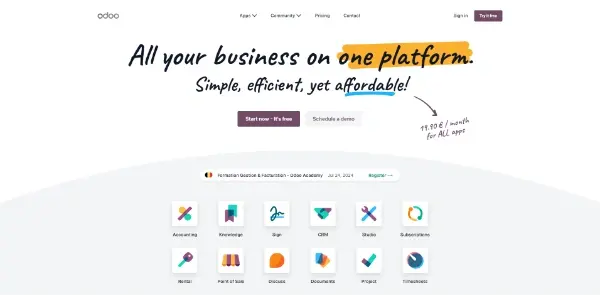Odoo

Open-source, customizable, all-in-one CRM and ERP management software. Over 40,000 applications are available on the platform, including AI assistants
Odoo: A Comprehensive Look at the Open-Source AI-Powered Business Management Suite
Odoo is a powerful, open-source, all-in-one business management software suite encompassing CRM (Customer Relationship Management) and ERP (Enterprise Resource Planning) functionalities. Its extensive app store boasts over 40,000 applications, many integrating AI capabilities to streamline various business processes. This article delves into Odoo's features, benefits, use cases, comparisons with similar tools, and its pricing structure.
What Odoo Does
Odoo provides a modular platform allowing businesses to customize a solution tailored to their specific needs. It centralizes various aspects of business operations, from sales and marketing to inventory management, accounting, and human resources. The integration of AI-powered assistants within many applications further automates tasks, improves efficiency, and provides valuable data-driven insights. Essentially, Odoo aims to be a single source of truth for all business data, enabling better collaboration and informed decision-making.
Main Features and Benefits
Odoo's core strength lies in its modularity and extensibility. Key features include:
- CRM: Manage leads, contacts, opportunities, and customer interactions efficiently. AI assistants can automate lead scoring, prioritize high-potential leads, and personalize communication.
- ERP: Handle inventory, manufacturing, purchasing, accounting, and project management within a unified system. AI can optimize inventory levels, predict demand, and automate invoice processing.
- eCommerce: Create and manage online stores, integrating seamlessly with other Odoo modules for streamlined order management and customer service. AI can personalize product recommendations and improve customer experiences.
- Human Resources: Manage employee information, recruitment, payroll, and performance evaluations. AI can assist with candidate screening and identify potential employee turnover risks.
- Project Management: Plan, track, and manage projects efficiently. AI can help predict project timelines and identify potential roadblocks.
- Marketing Automation: Automate marketing campaigns, personalize communication, and track results. AI-powered features can optimize campaign performance and target specific customer segments.
- Customization and Extensibility: Odoo's open-source nature and vast app store allow businesses to tailor the platform to their unique needs.
Benefits:
- Increased Efficiency: Automation of repetitive tasks frees up valuable time and resources.
- Improved Collaboration: Centralized data improves communication and coordination across departments.
- Data-Driven Decision Making: Access to real-time data and insights enables informed strategic decisions.
- Cost Savings: Reduced operational costs through automation and streamlined processes.
- Scalability: Odoo can adapt to businesses of all sizes, from startups to large enterprises.
Use Cases and Applications
Odoo's versatility makes it applicable across various industries:
- Manufacturing: Manage production processes, track inventory, and optimize supply chains.
- Retail: Manage sales, inventory, customer relationships, and online stores.
- Services: Manage customer interactions, projects, and resource allocation.
- Healthcare: Manage patient records, appointments, and billing.
- Education: Manage student information, courses, and administrative tasks.
Comparison to Similar Tools
Odoo competes with other business management suites like Salesforce, SAP, and Microsoft Dynamics 365. While these competitors offer similar functionalities, Odoo distinguishes itself through its:
- Open-Source Nature: Provides greater flexibility and control, allowing for extensive customization.
- Lower Cost of Entry: The free community edition offers a substantial base functionality. Although enterprise level add-ons exist.
- Modular Approach: Businesses can choose the modules they need, avoiding unnecessary expenses.
However, Odoo may require more technical expertise for advanced customization compared to some competitors with more user-friendly interfaces.
Pricing Information
Odoo offers a free community edition with core functionalities. Additional modules and enterprise features are available through paid subscriptions, with pricing varying depending on the modules selected and the number of users. Detailed pricing information is available on the official Odoo website.
In conclusion, Odoo presents a compelling alternative for businesses seeking a flexible, customizable, and cost-effective solution for managing their operations. Its open-source nature, coupled with the integration of AI-powered tools, makes it a powerful platform for driving efficiency, improving collaboration, and fostering data-driven decision-making.